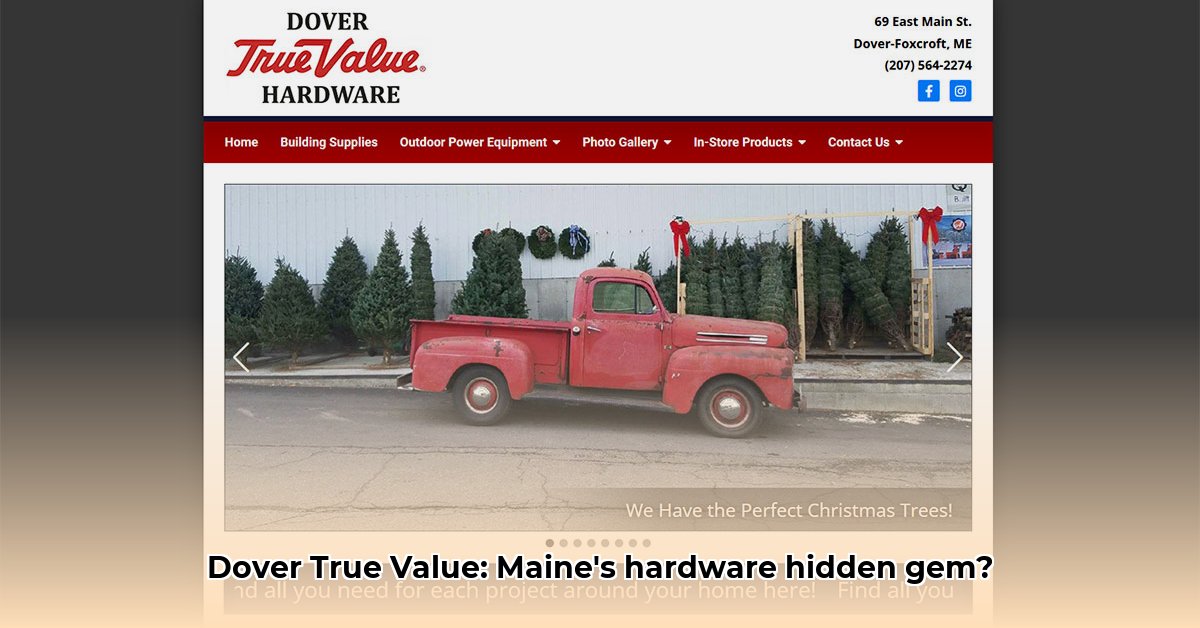
Dover True Value Maine: A Local Hardware Success Story
Dover True Value in Maine exemplifies the unique challenges and opportunities faced by independently owned hardware stores operating within a national franchise network. This case study examines their business model, competitive landscape, and strategic approaches to success, highlighting their ability to thrive in a market dominated by large retailers. How do they balance the benefits of a national brand with the needs of a local community? This deep dive reveals a compelling story of resilience and innovation in the face of significant competitive pressures.
The Balancing Act: Local Charm Meets National Reach
Dover True Value leverages the established brand recognition and supply chain access of True Value Corporation while retaining local ownership and control. This hybrid model presents both advantages and disadvantages. While the national brand provides a foundation for customer trust and access to a wider product range, it also necessitates adherence to corporate guidelines, potentially limiting local flexibility. The store's success hinges on effectively balancing these competing forces. Is this hybrid model the key to their success, or are other factors at play?
Facing the Giants: Competition in the Hardware Industry
The competitive landscape is dominated by large national chains like Home Depot and Lowe's, which possess considerable pricing power. Dover True Value understands this and counters not by strictly matching prices, but by differentiating itself through customer service and community engagement. This strategy focuses on building strong relationships with local residents, fostering customer loyalty that transcends price-based competition. What is the long-term viability of this strategy in the face of potential economic downturns or shifts in consumer behavior?
Opportunities and Roadblocks: A Path to Growth
While Dover True Value faces challenges such as price competition and economic fluctuations, several opportunities exist for growth. Strengthening partnerships with local contractors and enhancing their online presence are key avenues for expansion. Additionally, specializing in a niche market, such as sustainable or locally sourced materials, could further distinguish them from larger competitors. However, careful planning and resource allocation are crucial for capitalizing on these opportunities.
A Plan for Progress: Strategies for Growth
A multi-faceted strategic plan is essential for Dover True Value's continued success. The following strategies are tailored to different stakeholder groups:
For the Owners:
- Short-Term (0-1 year): Implement a customer relationship management (CRM) system to personalize interactions and track customer preferences. Conduct competitor analysis to identify areas for improvement in pricing and service. Optimize inventory based on local demand analysis.
- Long-Term (3-5 years): Cultivate strong relationships with local contractors and businesses for mutually beneficial partnerships. Invest in a robust online presence, including a user-friendly website and active social media engagement. Explore expanding their product offerings to cater to specific local needs or emerging market trends.
For True Value Corporation:
- Short-Term (0-1 year): Provide clear and consistent franchise guidelines on pricing and marketing. Develop a data-sharing platform for better benchmarking and performance comparisons across franchises. Invest in training programs focused on digital marketing and CRM proficiency.
- Long-Term (3-5 years): Enhance the support system offered to franchisees through ongoing research and development. Explore loyalty programs to strengthen brand loyalty. Analyze and optimize marketing strategies across various franchises.
For the Local Community:
- Short-Term (0-1 year): Actively support Dover True Value by utilizing their services and recommending them to friends and family.
- Long-Term (3-5 years): Support local businesses and advocate for policies that encourage small business growth. Participate in community initiatives to strengthen community ties and enhance brand awareness.
Managing Risk: Preparing for the Unexpected
Dover True Value must proactively manage potential risks:
| Risk Factor | Likelihood | Impact | Mitigation Strategy |
|---|---|---|---|
| Intense price competition | High | High | Focus on superior service, build strong customer relationships, explore niche markets. |
| Economic downturn | Medium | High | Implement cost-cutting measures, diversify product offerings, explore flexible financing options for customers. |
| Franchise relationship issues | Low | Medium | Maintain open and transparent communication with True Value Corporation, proactively address any concerns. |
| Supply chain disruptions | Medium | Medium | Diversify suppliers, maintain sufficient inventory levels, explore alternative sourcing options. |
The Future of Local Retail: A Story Still Unfolding
Dover True Value’s success demonstrates the potential for local businesses to thrive even within a competitive landscape. Their unique blend of local ownership and national brand affiliation, coupled with a strong emphasis on community engagement, provides a powerful formula. Continued adaptation, innovation, and strategic planning will be crucial for navigating the evolving retail market. The story of Dover True Value serves as a compelling case study for the future of local retail in the face of larger competitors. The ability to foster a strong sense of community while leveraging the advantages of a national brand may be a key to long-term survival and success.